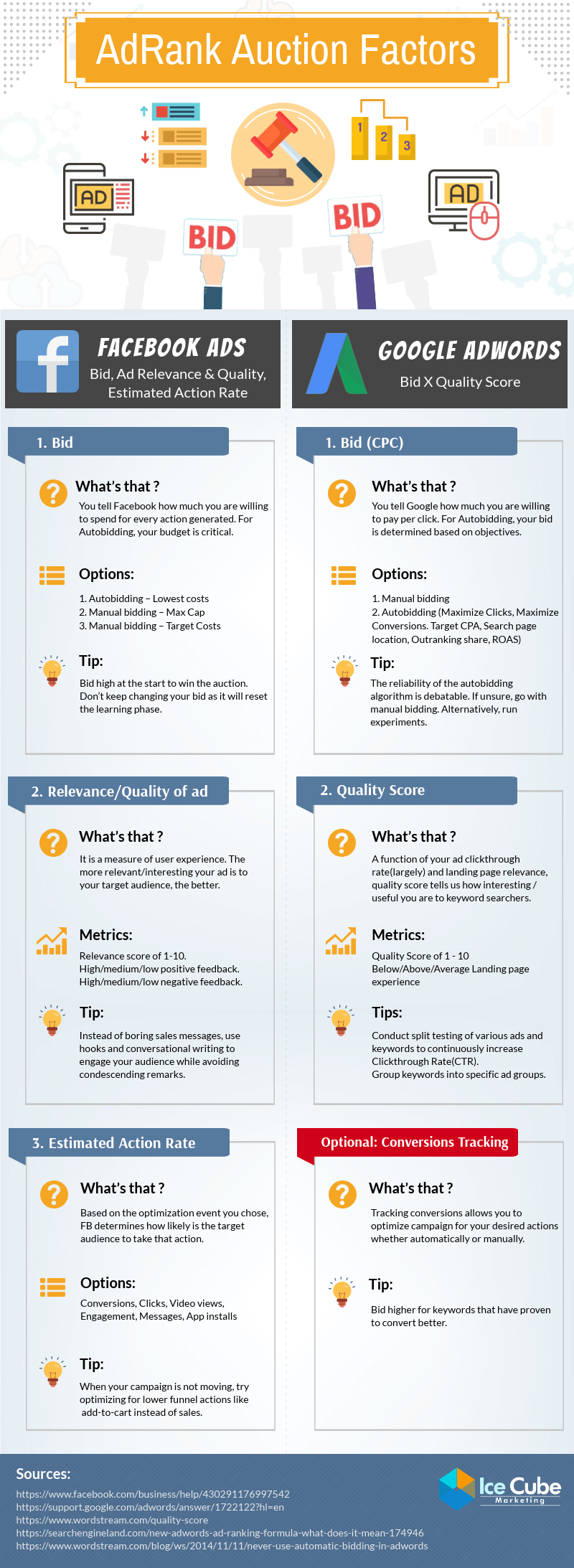When it comes to purchasing targeted traffic, most digital marketers think of either Google Adwords or Facebook. Both of these channels allow you to really home in on your ideal prospects and audiences so that you get the most value out of your ad spend. Both of these platforms also use an ad auction format that determines how much you pay. Here is an overview of how both of these platforms work.
1. Bidding
In both platforms, you bid for how much you are willing to pay. For Google Adwords, you simply set a cost per click while there are various actions you can pay for in Facebook (likes, video plays, leads, etc.).
With Google Adwords, you have the option to bid manually or let Adwords do the job automatically for you to maximize your traffic and ad position. Facebook works similarly. For Facebook, you typically start with autobidding because there is no “keywords planner tool” in which you could check the bid prices, unlike Google ads.
2. The Ad
Both Adwords and Facebook will determine how much your ad gets displayed and how much you pay based on the quality of your ad. Adwords uses something called quality score which looks at your ad CTR, landing page, and other important factors. Facebook looks for relevance based on the engagement your ad gets.
For Adwords, it’s recommended that you learn all the factors that contribute to your quality score. You’ll need to try different ads, segment keywords into smaller ad groups, and optimize your landing page for the best quality score possible.
For Facebook, it’s recommended that you create ads with interesting hooks and use a conversational tone. This grabs the attention of the user and helps your particular ad stand out from the other competing ads. Just make sure you don’t go overboard with hype, over-cliched statements, condescending language, and false messages.
3. Measuring Your Campaign’s Effectiveness
Tracking your campaign is essential to the success of any advertising campaign. For Google Adwords, you want to use conversion tracking to see which keywords are performing the best. You want to then bid higher, optimize ads, and increase your budget for keywords that are performing well.
For Facebook, you want to focus on looking at the estimate action rate along with your conversion tracking tools. Track the specific goals you’ve set for the campaign whether it’s clicks, video plays, likes, or lead conversions. If your campaign isn’t getting any traction, it’s recommended that you optimize for short term goals like clicks and products getting added to cart as opposed to solely looking at sales conversions.
As you can see, both platforms are similar in how they function. But there are key differences in how they work and you’ll need to take different actions to optimize and scale your campaign. Make sure you study both platforms extensively before you start scaling campaigns as both platforms are quite technical.
Ted is from Ice Cube Marketing, a digital marketing agency in Singapore that helps local small businesses acquire leads from channels such as Facebook and Google.
Author Profile
- As a passionate blogger, I write about SEO, Digital Marketing, WordPress, Web Hosting, and Business-related topics. I share my experiences and insights in different niches through my blogs, helping others navigate and succeed in the digital world.
Latest entries
 Tech Updates6th December 2025Top 5 WordPress Cache Plugins (2025)
Tech Updates6th December 2025Top 5 WordPress Cache Plugins (2025) Gaming7th December 2024Creative Promotions: Attracting New Users to Your Gaming Platform
Gaming7th December 2024Creative Promotions: Attracting New Users to Your Gaming Platform Tech Updates17th September 2024A Guide to Professional Audiovisual Solutions
Tech Updates17th September 2024A Guide to Professional Audiovisual Solutions Tech Updates6th September 2024Why CDN Is Essential for Video Streaming Business?
Tech Updates6th September 2024Why CDN Is Essential for Video Streaming Business?


